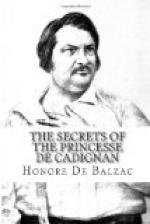“Let the marquis say what he thinks,” cried Rastignac. “When a man has been thrown by a fine horse he thinks it has vices and he sells it.”
Piqued by these words, the Marquis d’Esgrignon looked at d’Arthez and said:—
“Monsieur is not, I trust, on such terms with the princess that we cannot speak freely of her?”
D’Arthez kept silence. D’Esgrignon, who was not wanting in cleverness, replied to Rastignac’s speech with an apologetic portrait of the princess, which put the whole table in good humor. As the jest was extremely obscure to d’Arthez he leaned towards his neighbor, Madame de Montcornet, and asked her, in a whisper, what it meant.
“Excepting yourself—judging by the excellent opinion you seem to have of the princess—all the other guests are said to have been in her good graces.”
“I can assure you that such an accusation is absolutely false,” said Daniel.
“And yet, here is Monsieur d’Esgrignon of an old family of Alencon, who completely ruined himself for her some twelve years ago, and, if all is true, came very near going to the scaffold.”
“I know the particulars of that affair,” said d’Arthez. “Madame de Cadignan went to Alencon to save Monsieur d’Esgrignon from a trial before the court of assizes; and this is how he rewards her to-day!”
Madame de Montcornet looked at d’Arthez with a surprise and curiosity that were almost stupid, then she turned her eyes on Madame d’Espard with a look which seemed to say: “He is bewitched!”
During this short conversation Madame de Cadignan was protected by Madame d’Espard, whose protection was like that of the lightning-rod which draws the flash. When d’Arthez returned to the general conversation Maxime de Trailles was saying:—
“With Diane, depravity is not an effect but a cause; perhaps she owes that cause to her exquisite nature; she doesn’t invent, she makes no effort, she offers you the choicest refinements as the inspiration of a spontaneous and naive love; and it is absolutely impossible not to believe her.”
This speech, which seemed to have been prepared for a man of d’Arthez’s stamp, was so tremendous an arraignment that the company appeared to accept it as a conclusion. No one said more; the princess was crushed. D’Arthez looked straight at de Trailles and then at d’Esgrignon with a sarcastic air, and said:—
“The greatest fault of that woman is that she has followed in the wake of men. She squanders patrimonies as they do; she drives her lovers to usurers; she pockets ‘dots’; she ruins orphans; she inspires, possibly she commits, crimes, but—”
Never had the two men, whom d’Arthez was chiefly addressing, listened to such plain talk. At that but the whole table was startled, every one paused, fork in air, their eyes fixed alternately on the brave author and on the assailants of the princess, awaiting the conclusion of that horrible silence.




